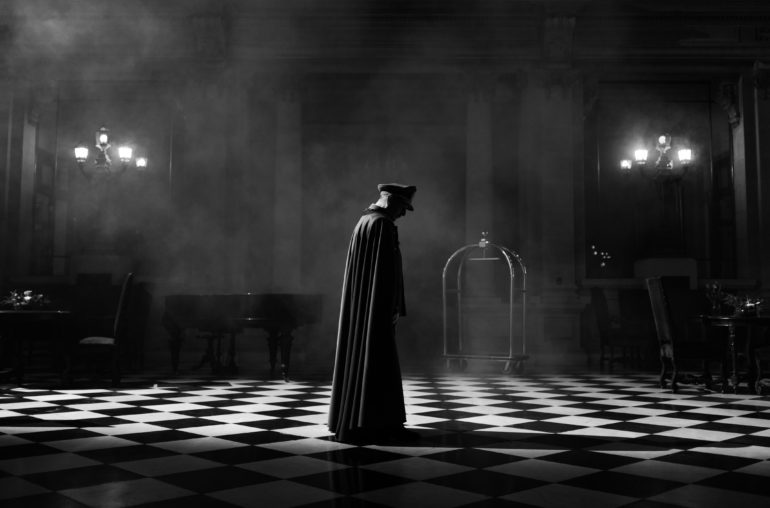Pablo Larraín is a man on a mission to question how we interpret history. This is not to suggest that he’s questioning the facts of the past (Plenty of people are doing that without him joining the pile-on). Instead, Larraín is playing with historical form rather than content. When retelling the stories of historical figures, whether it’s Pablo Neruda, Jackie Kennedy or Princess Diana, Larraín emphasises their heightened nature, forever hinting that these stories merely reflect truths, without needing to be entirely truthful. With that in mind, anyone familiar with South American history will know that portraying Augusto Pinochet as a vampire makes perfect sense. Thus, we arrive at El Conde (The Count).
It’s been 50 years since Pinochet seized power in a coup d’état in Chile. Deposing a democratically-elected government, Pinochet oversaw a particularly cruel dictatorship, with critics and political opponents routinely jailed, tortured and even murdered. The bloodthirsty vampiric version of El Conde (played by Jaime Vadell) is still murdering, but now he has to do the bloody task himself to sate his bloodlust. According to the wildly imaginative script by Larraín and Guillermo Calderón, this Pinochet is at least 250 years old, flitting between revolutionary France and 20th century South America with the ease afforded to the undead. Imagine Béla Tarr adapting Anne Rice, and you might get some measure of what Larraín is aiming for. In both in its look and its fatalism, there’s a gothic Romance to El Conde that seduces, even when a bloodthirsty dictator is the seducer. On numerous flights of fancy, the caped and uniformed Pinochet takes flight and scours Santiago to bring murder and fear to his populace once again. The real Pinochet died in 2006, but his shadow still looms large over his country.
This vampire isn’t content with virginal blood, though. He prefers whole hearts (Liquidized, naturally). The black and white cinematography is a blessing to any ratings boards that have to approve the goriness of El Conde, but it’s also an active callback to vampires of all kinds, from Dracula to Dracula: Pages from a Virgin’s Diary. As shot by the gifted Edward Lachmann (Carol, Far From Heaven), the interiors are pure German Expressionism, while the exteriors evoke that Tarr-like barren feeling of a near-apocalyptic wasteland. As long as Pinochet lives, that’s all Chile can be, suggests Larraín. Of course, some people are trying to kill him off. His wife Laura (Gloria Münchmeyer) and servant Fyodor (Alfredo Castro) have their own selfish motives, as do Pinochet’s five grown-up non-vampiric children.
But what comes of their efforts? For a good two-thirds of El Conde, the answer is: not much. Amid much bickering between the underwritten children, our main vampire hunter is a waif-like nun. Sister Carmencita (Paula Luchsinger) comes onscreen with a Joan of Arc bob and a steely determination to expel the devil from the dictator. Her investigation into the dictator, all financial records and questioning those near to him, feels like padding in a film that is sorely in need of narrative drive. The aimlessness of the first two acts reflects Pinochet’s increasing isolation and fatalism, but it also just drags. El Conde is a one-joke show, and the gag rate becomes increasingly low. The writers believe their premise is enough, but when dealing with a real figure, especially one so murderous, a little more meat on the bones is needed.
The real meat of El Conde comes in the final act, as loyalties are tested, more blood gets shed, and naturally the innocent must suffer. Our narrator (Another infamous 20th century leader) arrives to claim their rightful place in Pinochet’s story, and audiences will have to laugh in disbelief. El Conde is forthright in its attempts to examine the people and conditions that allowed a monster like Pinochet near power, but its takes too long to reach its conclusions, and offers only intermittent thrills. When a newly-transformed victim of Pinochet’s bite takes off in a joyous first flight, it feels like a payoff to a joke that took too long to tell, and that no-one asked to hear. One has to wonder how a Chilean audience will feel about El Conde’s approach to its recent blood-soaked history. It gets by on its looks and its wry sense of humour, but its languid flippancy might be the unintended final takeaway.

